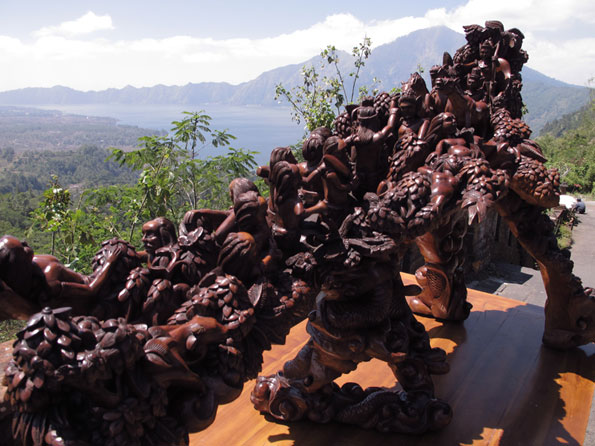I hug trees. Some trees hug me back. Learning about the sculptures around the place I live and work from my elders, I found out that my family has always had a thing about trees. Let me tell you about one sentimental sculpture in particular, which always gladdens my heart for a day of doing.
When she moved to the land that would become our family home, my great-grandmother built her bamboo and thatch hut next to a Jackfruit Tree that gave much joy to her seven children. Today it continues to give a sense of wonder to many in its incarnation as a sculpture that is the centrepiece of our hotel lobby.
Family lore has it that once upon a time my grandfather, eager to show more of the magnificent view to guests, suggested to cut it down. “Do it after I die,” was her acquiescence, which is the polite Balinese way of saying, “Over my dead body.”
Great-grandma passed on and became one with mother earth as a deity in our ancestral temple. My grandfather cut the tree down. He used the timber to build. He dug out the roots, and commissioned a sculptor to transform the stump.
The name carved upon one of the legs of the sculpture, one of the five roots dug out, is Gde Amerjaya Tjokot. From the ingenious way figures were brought out from the singular wood, expressing its inherent qualities, I would hazard to assume that the sculptor is a descendant or student of modernist woodcarver Tjokot (1886-1971). Where Tjokot’s work tended to be roughly hewn and abstract, however, this work is much more polished, reflecting Bali’s post-1965-communist-purge desire for order and striving for beauty.
There are so many figures carved into the tree, I can spend many minutes, even hours, studying it. It contains several scenes from the Mahabharata, an epic tale full of allegories for life with its many shades of grey between the purity of white and the darkness of black. And black, in our book, is not necessarily a bad thing.
Black is the colour of life, of Vishnu. Seeds germinate and sprout best in the black dark. On the ninth full moon of Bali’s lunar calendar, black is seen upon the banners flapping in the breeze, ushering Barongs from all around the island that come to pay homage to the spiritual source of Bali’s waters. The water that irrigates the rice-fields, the domain of Dewi Sri, a shakti of Vishnu.
In the cosmology of Bali, Mount Batur spatially holds the “up” northern position, where Vishnu resides. Vishnu’s element is water, abundantly filling a 12-km stretch of the caldera, forming Lake Batur. In local mythology, adopted and adapted from India, Vishnu the Preserver of Life incarnates upon the earth often, giving guidance to Man. He came as a fish to warn Manu of the coming of the great flood. He came as a turtle to help the gods attain the elixir of life to become immortal. In some stories he is more active, as a pygmy or lion-headed-man to defeat an evil king, or as Rama the lover of Sita who delivered Alengka from the clutches of Rahvana. Later stories identified the Buddha as an incarnation of Vishnu, but in the Mahabharata epic, he plays but a cameo role. Krishna, the incarnation of Vishnu, acts as advisor in the Mahabharata, and takes centre stage but briefly in the part known as “Bhagavadgita” when Arjuna’s faith falters and he is unsure of entering the battle.
The sculpture shows Krishna holding the reins of a chariot with Arjuna as passenger, riding through forests and battlefields. Life goes on in the forest, even as the men prepare to slaughter one another. In the Bhagavadgita’s third chapter, there is a discussion on Karma Yoga, the path to perfection through action. Krishna says, “You are fighting for justice, and that is your purpose… Do not be burdened by whether you will win or lose…”




